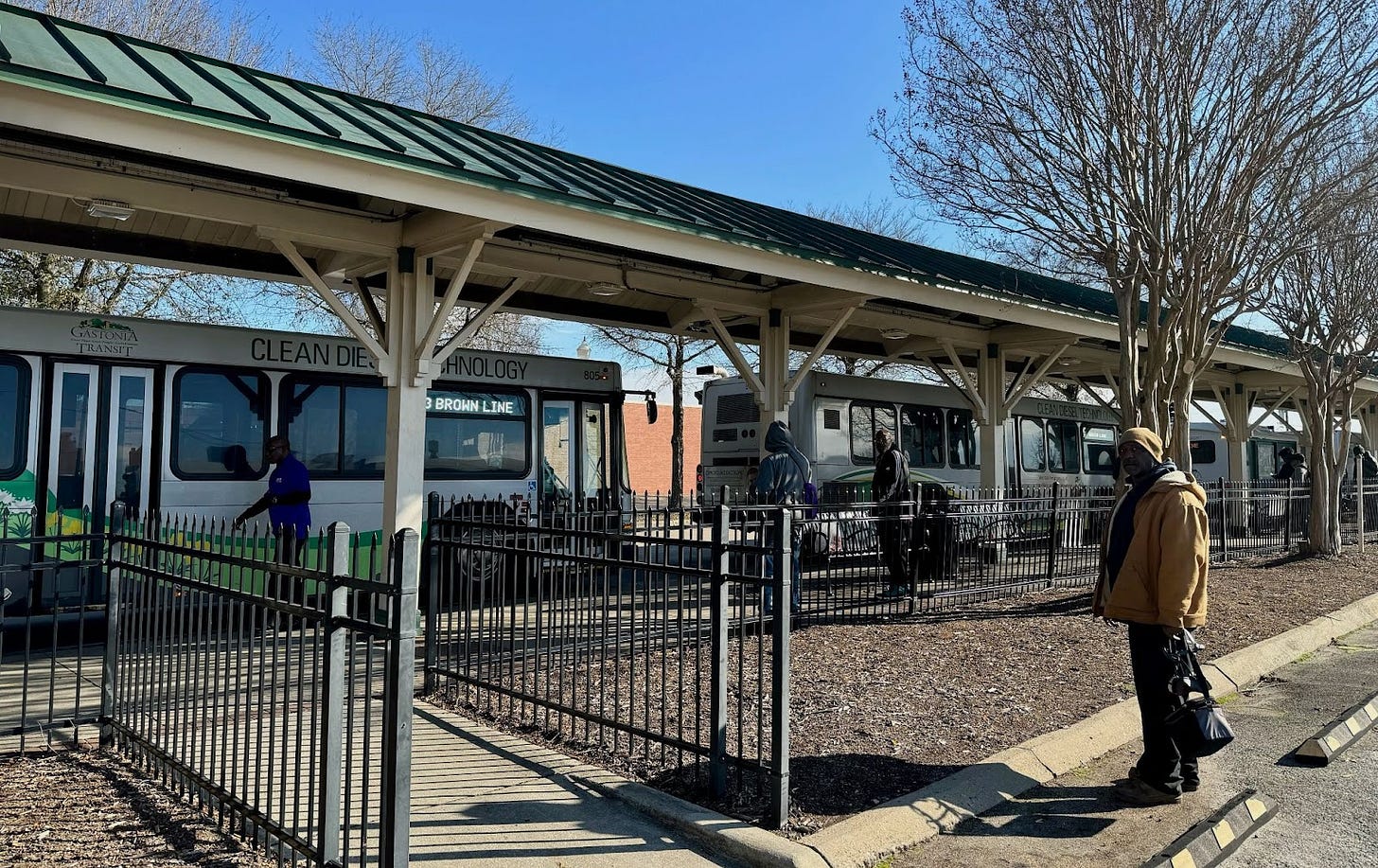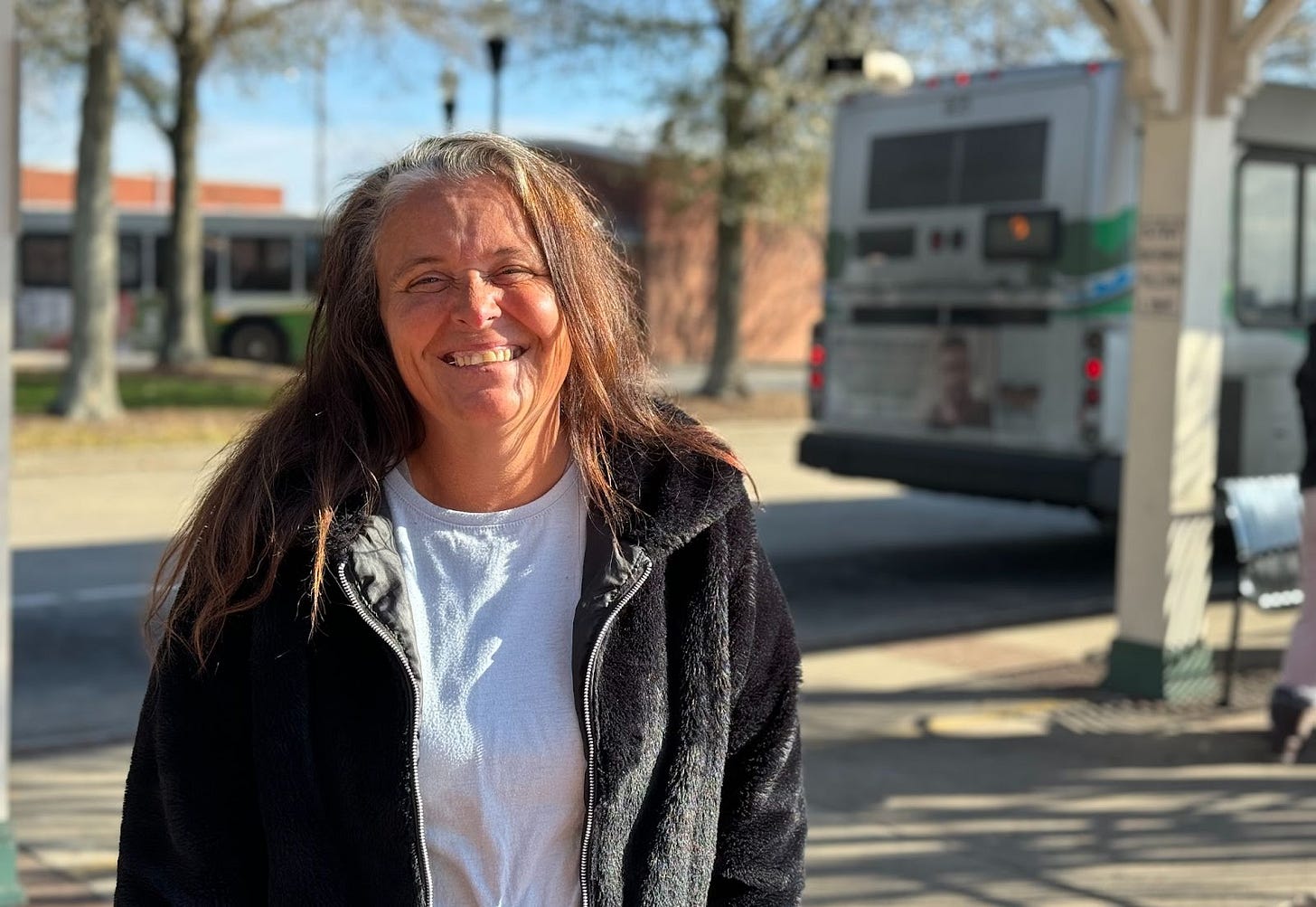Why Gastonia is getting rid of its buses
With traditional buses aging and failing to offer equitable service, ‘we needed to think about other alternatives,’ transportation director says
You’re reading Transit Time, a weekly newsletter for Charlotte people who leave the house. Cars, buses, light rail, bikes, scooters … if you use it to get around the city, we write about it. Transit Time is produced in partnership between The Charlotte Ledger and WFAE.
Gastonia, population 81,000, will be the biggest city in the state to shift to on-demand vans, SUVs and sedans for public transportation
Instead of running six bus routes at hourly frequencies from Bradley Station, Gastonia in July will start offering an Uber-like door-to-door transportation service. Some riders, like Gastonia resident Thorne Rodgers (pictured bottom right), hadn’t heard of the upcoming change. He rides the bus at least twice a day to get to and from his job. (Photo by Lindsey Banks)
By Ely Portillo and Lindsey Banks
Dozens of bus riders bustled around Bradley Station in downtown Gastonia on Monday afternoon, catching one of the six buses lined up at the station to take them to their jobs, homes, or to run errands.
When the buses pulled out about 10 minutes later, Bradley Station was left empty.
Gastonia resident April Stone, 49, said she rides the bus almost daily to take her grandchildren to and from her house and to get to her doctor's appointments and the grocery store. But starting in July, her daily trip will change: Gastonia is set to become the largest city in North Carolina to completely eliminate its fixed-route transit and replace the system with on-demand rides summoned via smartphone.
Stone learned about the decision to cut the bus routes from one of her bus drivers. She doesn’t know many details about the new service yet, but she’s optimistic that the on-demand ride service will make transportation more accessible.
“I think it’s going to be good … and convenient, but I’m going to miss meeting different people and talking to them,” Stone said.
Gastonia’s city council approved a $1.65 million contract with Via Transportation to implement “microtransit” in the city starting July 1. Gone will be the traditional, full-sized buses plying six routes to and from Bradley Station. In their place: A fleet of vans, SUVs and sedans operated by Via Transportation.
The new service will be similar to booking a ride with Uber or Lyft. Riders will use an app, website or call center to request a ride. The goal, Gates said, is for their driver to arrive within 15 minutes. Then, they’ll be taken to their destination — no waiting around at a bus stop involved. Riders can also schedule recurring rides, such as for their daily commute.
The service will take riders anywhere within Gastonia’s city limits, and Gates said the service area could be temporarily expanded to include nearby events. The algorithm behind the service will determine the most efficient routes to pool riders along the way, so riders would be likely to share the vehicles with someone else. (Think UberPool, not UberX.) And unlike Uber and Lyft, Gastonia’s new transit service won’t operate 24/7.
Gastonia resident Thorne Rodgers didn’t know the bus transit system was ending until Transit Time informed him about it.
“Wow,” Rodgers said in response. “Wow. Wow.”
Rodgers relies on the buses to get him to and from his job every day. He worries that the cost of the new on-demand ride service will be too high.
“It can’t be cheaper than the bus,” Rodgers said.
One-way bus fare in Gastonia is $1.25. City officials said there are currently no plans to change that (For comparison, Wilson, N.C.’s on-demand transit service costs $2.50 a ride.)
Randi Gates, the city’s transportation director, said in an interview with Transit Time that there are numerous reasons for moving away from a fixed-route system. At almost 20 years old, many of the buses need replacing, an expensive proposition. The six routes cover only a small fraction of the city. And buses arrive only once an hour, making the current system inconvenient at best — or nonfunctional at worst — for riders who need to get to work or medical appointments that aren’t near bus stops.
“It isn’t great access, and it’s not equitable. So all of those things are what led us to know that we needed to think about other alternatives for public transportation,” she said.
Gastonia’s existing bus network runs throughout different parts of the city, but not always to precisely where riders want to go, the city’s transportation director says.
Gates said the city will conduct a big marketing push over the next six months to let people know about the coming changes. They might rebrand the system from “Gastonia Transit” (which, let’s be honest, isn’t that exciting) to something snazzier. The city will also buy a fleet of 14 small passenger vehicles to operate the new service. Via is holding job fairs in the coming month to discuss options with the current bus drivers and other transit workers, Gates said.
Smaller city, but big move to microtransit
Gastonia is about a tenth of the size of Charlotte, at around 81,000 residents. But it will be the largest city in the state to move from a fixed-route to on-demand transit service.
Wilson, one of the other prime examples of microtransit in North Carolina, has about 47,000 residents. The Charlotte Area Transit System plans to experiment with offering microtransit in small zones. Charlotte is about seven times larger geographically than Gastonia.
“It’s really exciting that we could be a leader in this,” Gates said. “Also, we have to make sure we’re doing it right if we’re going to set that example.”
Gastonia’s transit system moved about 144,000 riders last year. But Gates said that meant buses carried an average of only seven passengers. It’s both inefficient and a bad look, Gates said.
“So that means a lot of empty buses, and the perception of that to our taxpayers, and everything that goes along with that,” Gates said.
When she takes the bus, Stone says that sometimes, there isn’t an empty seat in sight. Other times, she’s the only one on it.
April Stone relies on the bus multiple times during the week to transport her grandchildren and run errands. (Photo by Lindsey Banks)
To make sure the system is accessible to older riders and low-income people without bank accounts, Gates said the system will also include an option to call and book a ride as well as cash payment for tickets (though she expects most people will pay via the app).
Express commuter buses to Charlotte, which are operated by CATS, won’t be affected. Gastonia will also continue to operate its ADA-compliant paratransit services for disabled riders, Gates said.
For the city, the new on-demand service won’t cost materially more than the current transit system, Gates said, but it won’t save money either — it’s pretty much a wash. If there are cost overruns, the city council would have to come back to vote on spending more money.
It’s not clear yet what impact Gastonia’s move away from traditional transit will have on the nascent regional push to build an integrated, synchronized bus system across multiple counties. That idea — summed up in the Connect Beyond regional blueprint — relies on connecting fixed-route transit systems.
Gates said it’s critical to adapt transit to changing technologies and habits.
“It’s just going to save our residents a lot of time when using public transportation,” she said. “We know, too, that our population is growing pretty rapidly. And so we are trying to think through: How are we moving our residents around the city?”
Ely Portillo is senior editor for news and planning at WFAE, Charlotte’s NPR news source. He was previously with the UNC Charlotte Urban Institute and spent a decade as a reporter at The Charlotte Observer. Reach him at eportillo@wfae.org
Lindsey Banks is a staff writer with The Charlotte Ledger. Reach her at lindsey@cltledger.com.
Related Transit Time article:
“Small N.C. towns replace buses with on-demand shuttles” (April 21, 2022)
Transit Time is a production of The Charlotte Ledger and WFAE. You can adjust your newsletter preferences on the ‘My Account’ page.
Did somebody forward you this newsletter and you need to sign up? You can do that here:
Other affiliated Charlotte newsletters and podcasts that might interest you:
The Charlotte Ledger Business Newsletter, Ways of Life newsletter (obituaries) and Fútbol Friday (Charlotte FC), available from The Charlotte Ledger.
The Inside Politics newsletter, available from WFAE.










So why ride Uber when you can ride for $2.50 anywhere in Gastonia? Gonna be interesting.